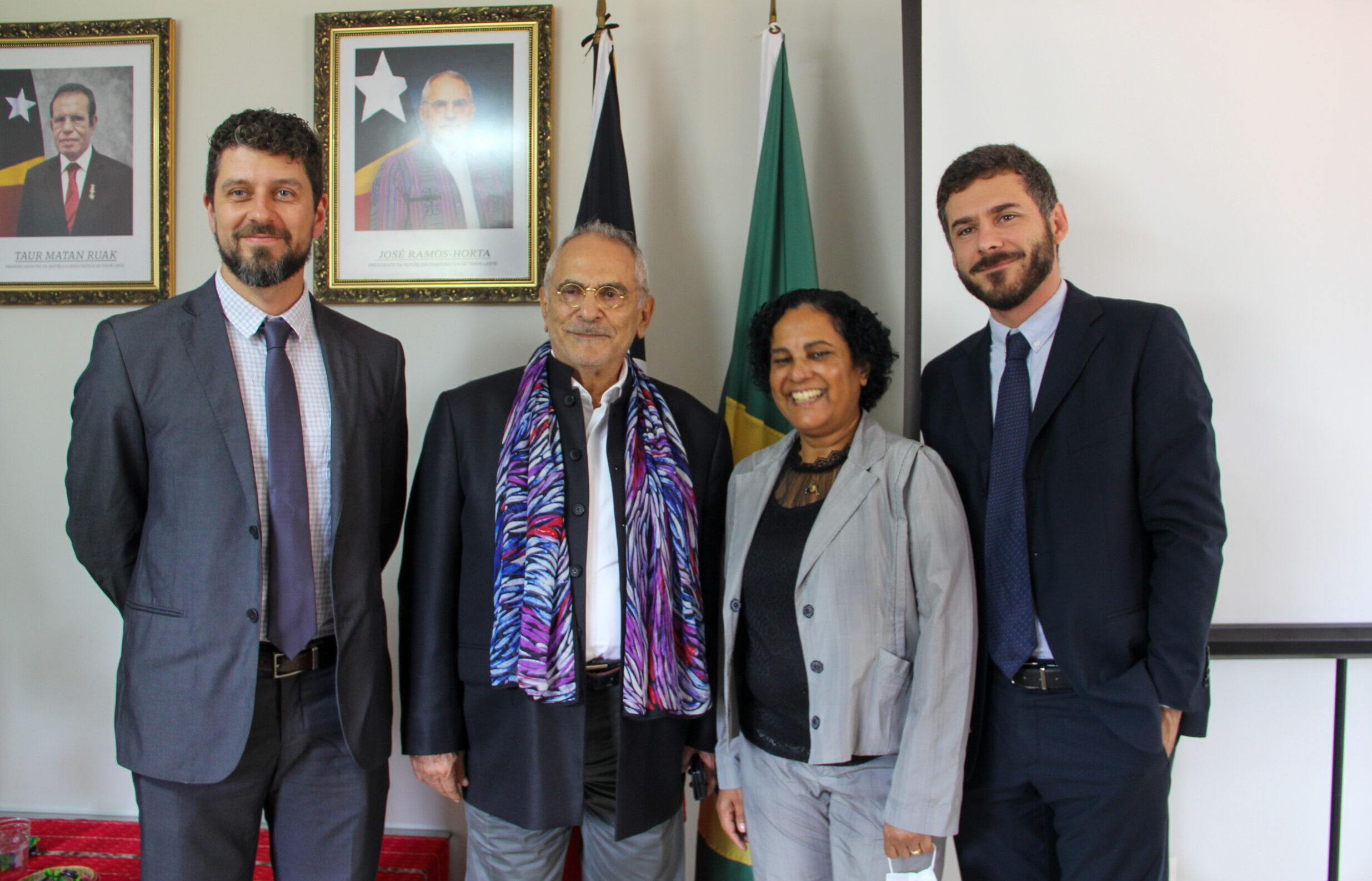
Representatives from the World Food Programme (WFP) Centre of Excellence against Hunger Brazil and the Brazilian Cooperation Agency (ABC) met this Tuesday morning, January 3, with the President of the Democratic Republic of East Timor, José Ramos-Horta, to present the work developed by the Centre, the National School Feeding Programme (PNAE) and propose partnerships. The meeting, which took place at the East Timor embassy in Brasilia, brought the Brazilian experience of school feeding as an effective strategy to fight hunger, besides presenting measures that Brazil adopts in the fight against malnutrition, the production of healthy and adequate food and investment in basic sanitation, among other social programmes.
The Nutrition and Agriculture Project Coordinator, Albaneide Peixinho, and the Deputy Head of Programmes, Vinícius Limongi, presented the institution’s work with South-South technical assistance to promote actions against hunger and highlighted the work already carried out by the World Food Programme (WFP) in East Timor. Albaneide also mentioned the work of the Beyond Cotton and Nurture the Future projects, both carried out in partnership with ABC, aimed at ensuring food security and fighting the multiple burden of malnutrition in countries in Africa, Asia and Latin America. “We learn a lot from these countries and learning is always a two-way process. We also bring to Brazil proposals for improvements to the programmes that already exist here,” said Albaneide.
To ensure the continuity of activities with the countries, the Centre’s work is not limited to on-site technical support, but much of the work is also done in daily and continuous contact with the countries. Vinícius Limongi highlighted the role of the Virtual Study Visit in helping to create and maintain school feeding programmes in countries in Africa, Asia and Latin America. “Timor was the first country we worked with on a visit to Brazil,” Vinícius mentioned as an example of cooperation in recent years.
ABC Ambassador Ruy Pereira conducted a presentation on the work of the institution, highlighting the principles of Brazilian cooperation: horizontality, neutrality, non-conditionality and mutual benefits. “Cooperation is one of the ways in which Brazil will return to the international stage, by occupying the role of protagonist that it has historically had,” said Ruy.
President José Ramos-Horta stated that one of his priorities in government is the fight against poverty. “It is abominable that with the financial resources we have, derived from our honest exportation of oil and gas, we still have so much poverty and malnutrition,” he said. According to him, the president is an advocate for society and can influence the debate and decisions and has a key role in the mission to reduce inequalities and end hunger.
The meeting was also attended by Luciana Mendonça Gottschall, Coordinator of Budgetary and Financial Management of School Feeding at FNDE, who presented how the Brazilian National School Meal Programme works, highlighting the supplementary nature of education and how the Federal Government’s contribution to the states and municipalities works.
Also present were the Ambassador Luiza Lopes, Minister José Solla, General Coordinator of Humanitarian Cooperation of ABC, Paulo Lima, responsible for Bilateral Technical Cooperation with PALOP countries and East Timor, and Plínio Pereira, substitute responsible for Trilateral Cooperation with Multilateral Organisations.
East Timor and Centre of Excellence: background
The government of East Timor and the Centre of Excellence have worked together since 2011, when a technical mission from East Timor came to Brazil to discuss strengthening school feeding. The Timor delegation attended institutional meetings in Brasilia and then conducted field visits to urban and rural schools and family farmer farms in the city of Orós (Ceará).
In 2016, remote support from the WFP Centre of Excellence in Brazil was embedded in the seminar entitled “Investing in Nutrition – The foundation for Development”. This event was organised by the local WFP office in East Timor and its government, with the goal to broadening participants’ understanding of the importance of targeted and multidimensional interventions to address malnutrition. As a direct result of the workshop, the East Timor parliament unanimously passed a resolution supporting the government’s decision to prioritize efforts to ensure access to nutrition for women and young children as a way to achieve Sustainable Development Goal 2 (eradicate hunger).
Already in 2018, representatives of the government of East Timor participated in the international seminar “Sustainability of School Feeding Programmes in the countries of the Community of Portuguese Language Countries (CPLP)”, held as part of the X Meeting of CPLP Ministers of Education, in Salvador. Last year, in 2022, school feeding managers and officials from World Food Programme (WFP) offices in Angola, East Timor, Guinea Bissau, Mozambique, Sao Tome and Principe and Brazil participated, on 23 August, in an online dialogue on best practices in nutrition and main challenges in implementing school feeding programmes.




